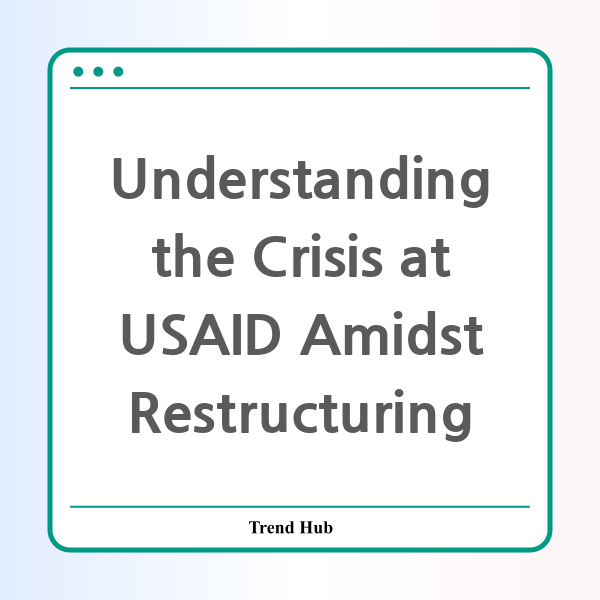* This website participates in the Amazon Affiliate Program and earns from qualifying purchases.

What are the implications of the recent changes at USAID for foreign aid officers?
The recent announcement concerning the restructuring of the U.S. Agency for International Development (USAID) has stirred significant concern among foreign aid officers. With nearly 1400 USAID officials facing a directive for immediate administrative leave and a looming resignation deadline, many are left grappling with the uncertainties of their career trajectories and the broader impacts of this unprecedented situation.
Thomas Yazdgerdi, president of the American Foreign Service Association (AFSA), articulates the gravity of the situation. He emphasizes the need for clarity and communication from agency leadership, especially as nearly 13,000 active members and 4,000 retirees are affected by this sudden move. The anxiety is palpable among the officers who are asking pressing questions: What does this mean for my job security? How will this affect my family? What options do I have regarding exemptions?
As stated by Yazdgerdi, AFSA's role is to ensure that all members have access to relevant information, allowing them to make informed decisions. The association stresses the importance of understanding the implications of retirement versus resignation versus being let go. Each scenario holds different impacts on their work life and retirement benefits, underscoring the weight of this decision-making process.
Moreover, the logistical challenge of relocating over a thousand officials worldwide within a matter of hours presents further complications. The costs associated with such a move could amount to tens of millions of dollars, while also uprooting families and disrupting lives. Many officers report feelings of chaos and fear as they navigate this swift and sweeping change.
What can be done to address the uncertainties?
Yazdgerdi advocates for transparency in communication from the State Department regarding who qualifies for exemptions from the administrative leave and the criteria to meet mission-critical status. The ambiguity surrounding these points adds to the stress experienced by employees and their families.
AFSA's historical role as a nonpartisan organization allows it to defend its members' rights, including collective bargaining rights established decades ago. They are actively exploring legal avenues to ensure that voice remains in the decision-making process, especially concerning the impact this restructuring has on the workforce.
This situation raises broader questions about the future of USAID and American foreign policy implementation. Officers are keenly aware that their roles are to enforce the policies of the administration, yet they also recognize the necessity of safeguarding their rights and well-being. The recent developments, coupled with a lack of clear guidance, form a concerning backdrop for the operations at USAID.
As the deadline approaches, ongoing dialogue between AFSA and agency leaders is critical. It is imperative that the unique needs and concerns of foreign aid officers are considered, as this workforce is vital to the overarching goals of American foreign aid and international development. Without their expertise and commitment, the very fabric of USAID’s mission is at risk.
In conclusion, the landscape of USAID is undergoing tumultuous changes that require swift yet thoughtful responses to safeguard the interests of its dedicated foreign aid officers. As we witness this unfolding crisis, it is essential to remain informed and engaged as the situation develops.
* This website participates in the Amazon Affiliate Program and earns from qualifying purchases.